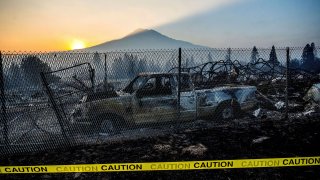
Her home destroyed, dog missing, and 10-year relationship with her boyfriend recently ended – all Naomi Vogelsang could do on Saturday was sit outside of a Northern California wildfire evacuation center with $20 in her pocket, waiting for a ride to the casino.
“It can’t be any worse,” she said.
Vogelsang is one of thousands of people displaced this week by California’s latest inferno, this time in the small community of Weed about 280 miles (451 kilometers) northeast of San Francisco. Most visitors know this town as a novelty, a place to stop while traveling on Interstate 5 and buy an ironic T-shirt.
But for the people who live here, the past few years have introduced another worry in a world full of them: Dark skies, swirling ash and flames that race so quickly they leave little time for escape.
Get top local stories in San Diego delivered to you every morning. Sign up for NBC San Diego's News Headlines newsletter.
This time it was a blaze known as the Mill Fire. Flames raced from Roseburg Forest Products, which makes wood products, into the Lincoln Heights neighborhood where a significant number of homes burned and residents had to flee for their lives on Friday afternoon. The blaze spread to more than 6.6 square miles (17 square kilometers) by Saturday evening and was 25% contained.
After fleeing the blaze, 63-year-old Judy Christenson remembered a similar escape 40 years ago when, as a young parent, she had to rush her children out of a burning home. Last summer, a wildfire forced her to evacuate and leave her pets behind. Now, Christenson says she leaves harnesses on her pets all the time so she can grab them at a moment’s notice and leave.
“Whenever this happens, I get really bad,” Christenson said from the front seat of a car at an evacuation center in Yreka as Felix, her orange cat, napped in the backseat. “I can’t think straight.”
U.S. & World
Nestled in the shadow of Mt. Shasta — a 14,000-foot (4,267.2-meter) volcano that is the second-highest peak in the Cascade Range — Weed is no stranger to wildfires.
Strong winds in the area that fan flames drew the town's founder for a very different reason. Abner Weed, a Civil War soldier who is said to have witnessed the Confederate Gen. Robert E. Lee’s surrender before moving to California, chose to put a sawmill there because the wind would dry out the timber, according to Bob West, a lifelong resident who co-owns Ellie’s Espresso and Bakery, a coffee and sandwich shop that contains some historical items of the town’s past.
The winds make Weed and the surrounding area a perilous place for wildfires, whipping small flames into a frenzy. Weed has seen three major fires since 2014, a period of extreme drought that has prompted the largest and most destructive fires in California history.
That drought persists as California heads into what traditionally is the worst of the fire season. Scientists say climate change has made the West warmer and drier over the last three decades and will continue to make weather more extreme and wildfires more frequent and destructive.
Dominique Mathes, 37, said he’s had some close calls with wildfires since he has lived in Weed. But he’s not interested in leaving.
“It’s a beautiful place,” he said. “Everybody has risks everywhere, like Florida’s got hurricanes and floods, Louisiana has got tornadoes and all that stuff. So, it happens everywhere. Unfortunately here, it’s fires.”
Evacuation orders were quickly put in effect Friday for 7,500 people – including West, who is 53 and has lived in Weed since he was a 1-year-old. He had never had to evacuate for a fire, but now he’s had to do it twice.
“It’s way worse than it used to be,” he said. “It affects our community because people leave because they don’t want to rebuild.”
Cal Fire Siskiyou Unit Chief Phil Anzo said crews worked all day and night to protect structures in Weed and in a subdivision to the east known as Carrick Addition. He said about 100 structures were destroyed.
Two people were brought to Mercy Medical Center Mount Shasta. One was in stable condition and the other was transferred to UC Davis Medical Center, which has a burn unit.
“There’s a lot at stake on that Mill Fire,” Anzo said. “There’s a lot of communities, a lot of homes there.”
Evacuees and firefighters quickly filled up local hotels while others rushed to stay with family and friends outside of the evacuation zone.
Vogelsang was not as fortunate. She said she slept on a bench in Weed until she could get a ride to the evacuation center. She said she’s spent most of the time crying about Bella, her 10-year-old English bulldog who — despite her best efforts — would not follow her out of the fire and is lost.
“My dog was my everything,” she said. “I just feel like I lost everything that mattered.”
___
Associated Press journalist Stefanie Dazio contributed from Los Angeles.



